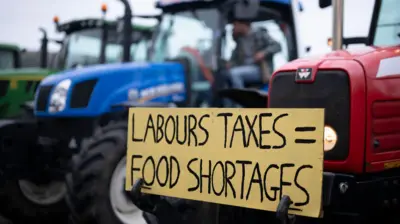We've updated our Privacy and Cookies Policy
We've made some important changes to our Privacy and Cookies Policy and we want you to know what this means for you and your data.
States, debt, nationalisation and money
Image source, Press Association
- Author, Chris Cook
- Role, Policy editor, Newsnight
Imagine you got a bargain. You bought a ВЈ1m house for ВЈ100,000. And imagine you get a great deal on the mortgage. It's only a tiny portion of your disposable income. Anyone hearing that would think you'd done well.
Anyone except an official from a finance ministry.
All around the world, governments use a particular way of thinking about debt. If they applied it to our story, they would see the ВЈ100,000 debt and the flow of payments to service the mortgage.
But they would not notice you had a ВЈ1m asset and were living in a cavernous house rather than a tiny flat.
That is the consequence of a focus on a particular sort of net debt and the deficit. Governments have a way of thinking that focuses on cash-flows and liabilities.
Debts and assets
But released today, has pointed out that this focus - which misses the benefit of non-financial assets - can be extremely misleading.
The Japanese state, for example, looks like a global laggard if you just look at debt - it has debt three times its national output.
But because it owns a lot of stuff, the aggregate fiscal position is a lot better. It has a big mortgage. They also have a lot to show for it.
Conversely, Germany has little debt, but also little stuff to offset it. (Norway, which has a huge fund of oil money salted away, is in clover.)
Britain's debt looks like a bigger problem when you consider that our government owns relatively little to offset it. Of the states they analysed, only Portugal has a worse overall position, relative to the size of their economy.
Image source, IMF
This is not the only thing worth considering: Russia's apparent solvency on this measure is a rather rosy way of presenting its current state.
And there are risks to states owning a lot of stuff: if our state still owned Pickfords removals, would you trust it not to make regulation work better for them than other removers? They could end up dampening competition, which can lead to poor outcomes for consumers.
And the state can be a bad owner: if it is politicians who decide on what gets investment, politics can make it difficult to get money into things. Our railways, under nationalisation, were not renowned for being a growing network crawling with slick new locomotives.
Slightly odd accounting
Our Treasury has tended to take the view that it should seek to minimise the complexity of its balance sheet. It dislikes holding onto assets that it could sell - even if that means selling things at a steep discount, For example, it loses money when it sells tranches of the student loan book.
But this is rarely recognised: the slightly odd way we do public sector accounting means that even if I take a ВЈ100bn asset and sell it for ВЈ10bn, it shows up in the accounts as a ВЈ10bn windfall. The real effect - a net loss of ВЈ90bn - is disguised.
Conversely, if the state buys up private assets - as Labour has proposed - then our official national accounts will turn blood-red because we will need to issue debt to buy out the current owners. But that is because we ignore the assets: so long as the Treasury pays a fair price we will really be exchanging, say, ВЈ100bn of government debt for ВЈ100bn of shares.
There are strange consequences to our aversion to holding public assets.
The government is keen, for example, for hospitals to shed extra land they have nearby. Sell it and use the money to build, they say. This is also a bet that we will not be desperate for land adjacent to large hospitals for expansion in the next few decades. A bold punt - and one we took without much thought for decades ahead.
Governments could learn a lot from what people ask when they hear from friends who are first-time buyers: they are more interested in the house than the mortgage.
Top Stories
More to explore
Most read
Content is not available








